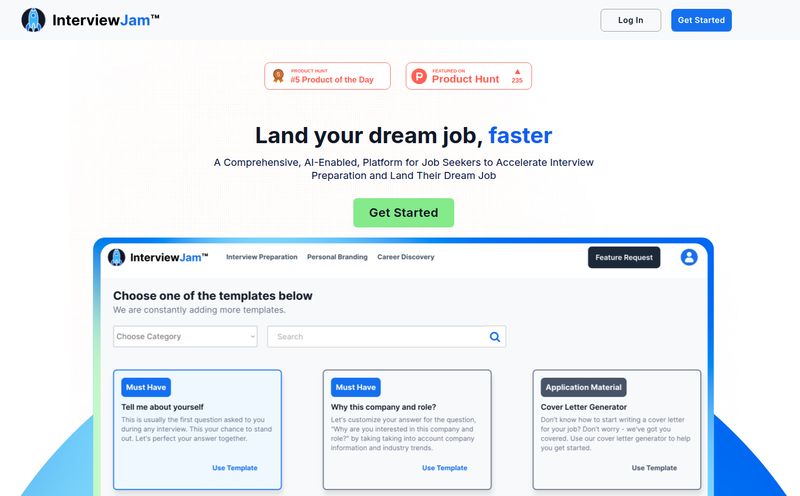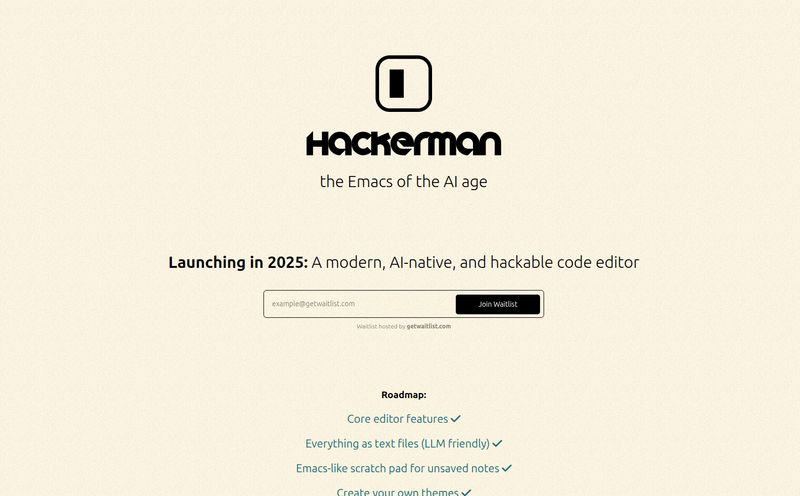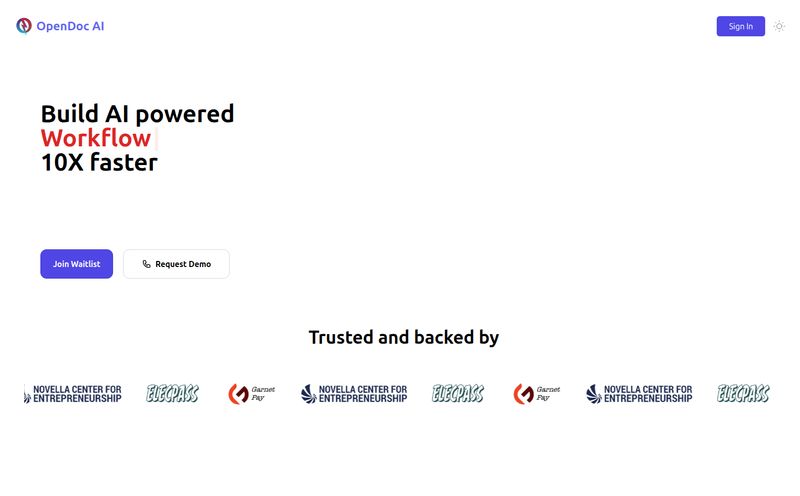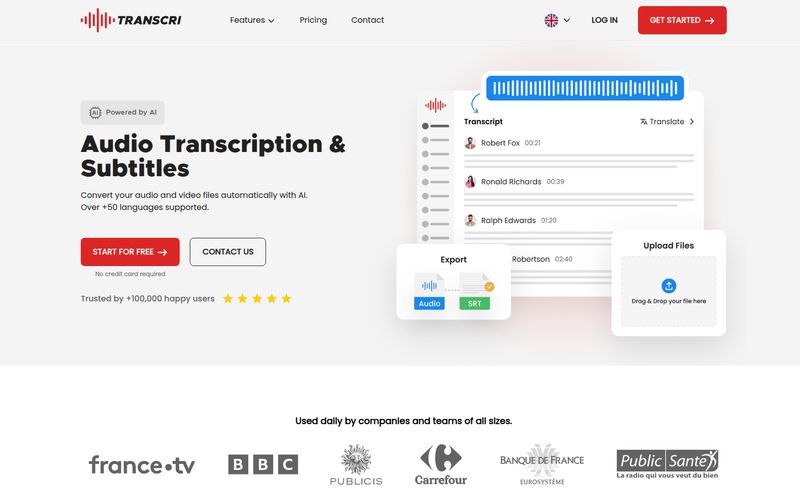Job interviews are uniquely stressful. It’s like a first date, a final exam, and a public speaking gig all rolled into one sweaty-palmed package. You spend hours researching the company, practicing your "biggest weakness" answer in the mirror, and trying to project an aura of calm competence. But when you’re live on that Zoom call, staring at a grid of faces, it's easy for your mind to go completely blank. What if you had a secret sidekick? A tiny, digital coach whispering the perfect answer right when you need it? That's the wild promise of tools like Interviews.chat, and I had to see if it was legit.
So What Exactly Is Interviews.chat?
So, what is this thing? At its core, Interviews.chat is an AI-powered platform built to take some of the terror out of the job hunt. It’s not just one thing; it’s a whole suite of tools. Think of it as a digital career-prep kit. It helps you build your resume, generates practice interview questions tailored to the job you want, and gives you feedback on your answers. But the star of the show, the feature that made me raise an eyebrow and say, "okay, you have my attention," is the AI Interview Copilot.

Visit Interviews Chat
The AI Interview Copilot: Your Secret Weapon?
This is where things get interesting. The Copilot is designed to work during your live virtual interview. It integrates with your meeting software and listens in. When the interviewer asks a question, the AI gets to work, feeding you real-time suggestions and talking points on your screen. It's like having the smartest, fastest-thinking version of yourself feeding you lines. The idea is to help you overcome those "uhhh" moments and articulate your thoughts more clearly. It’s a safety net, designed to catch you before you fall flat.
I was skeptical, of course. Would it be distracting? Would the answers sound robotic? In practice, it's a bit of a dance. You can’t just read the suggestions verbatim. That would be weird. Instead, you have to treat them as prompts—springboards for your own authentic answers. The AI gives you the keyword, the core idea, and you flesh it out with your own experience and personality. It's less about cheating and more about augmenting your own brainpower when the pressure is on.
Beyond the Live Interview: The Prep Tools
While the Copilot is the main event, the supporting cast of features is pretty solid, too. You can't just rely on a safety net; you still need to do the foundational work.
Personalized Interview Prep
Before you even get to the interview, the platform can act as your personal sparring partner. You feed it a job description, and it spits out a list of likely questions—from the classic "Tell me about yourself" to more specific behavioral and technical queries. You can then practice your answers and get AI-driven feedback on your clarity, confidence, and use of relevant keywords. This alone is a huge step up from just rehearsing in front of a mirror.
Resume and Cover Letter Builders
Honestly, I've seen a million of these, and most are pretty generic. The ones inside Interviews.chat are... fine. They get the job done. If you're starting from scratch or just need to whip up a quick cover letter tailored to a specific application, they’re a useful addition. It's a nice-to-have feature that rounds out the package, but probably not the main reason you'd sign up.
Career Exploration
There are also some resources for career exploration, which I think is a thoughtful touch. For those who are not just looking for a job but maybe a whole new direction, this can provide some initial guidance. It's a small part of the platform, but it shows they're thinking about the entire job-seeking process.
Let's Talk Money: A Look at Interviews.chat Pricing
Alright, the all-important question: what does this cost? There's no free version that I could find, so you have to be willing to invest. The pricing is based on a subscription model with a "credit" system that can be a little confusing at first.
Here’s my breakdown of their plans:
- Interview AI Starter: This is your entry point at $19 per month. You get 1000 credits. Here’s the catch: 1 credit equals either one minute of using the live Copilot or one suggestion from the Copilot. So if you have a 30-minute interview and get 15 suggestions, you've just burned 45 credits. This plan is probably best for someone with just one or two big interviews lined up.
- Interview AI Booster: For $29 per month, you still get 1000 credits for suggestions, but you get unlimited time for the Copilot. This makes a huge difference. You don't have to watch the clock during your interview, which defeats the whole purpose of a tool meant to reduce anxiety. In my opinion, this is the most practical plan for active job seekers.
- Interview AI Pro: This one is billed quarterly at $69 (which breaks down to $23/month). It gives you 3000 credits for suggestions and unlimited Copilot time. If you anticipate a longer job search or have a ton of interviews on the horizon, this offers the best value.
The credit system for suggestions is an interesting choice. It encourages you not to become overly reliant on the AI, but it also feels a bit nickel-and-dimey. The jump to the Booster plan for unlimited time seems almost necessary for the core feature to be truly effective.
The Good, The Bad, and The AI
No tool is perfect, especially one using AI that's still learning. After spending some time with it, here's my honest take.
What I Loved
The real-time support is a game-changer for anxiety. Just knowing it's there can be a massive confidence boost. I was also impressed by the multi-language support, which makes it accessible to a much wider audience. For non-native English speakers, this could be an incredible tool for finding the right phrasing. The integration with major platforms like Zoom and Google Meet is also smooth, which is a big technical hurdle they seem to have cleared.
A Few Caveats
Let's be clear: this is an assistant, not a replacement for your brain. The AI suggestions are not always 100% perfect. Sometimes they're a bit generic, and other times they might slightly miss the nuance of a question. The real skill is learning to quickly filter its output and weave it naturally into your own speech. If you just parrot the AI, you’ll sound like a robot and the interviewer will notice. Its effectiveness really, really depends on the user. And, of course, the best features are locked behind that paywall.
Who Is This Tool Really For?
So, who should shell out for Interviews.chat? I see a few key groups. Recent graduates facing their first corporate interviews. Career changers trying to break into a new industry and struggling with the jargon. Anyone who suffers from serious interview anxiety and needs a confidence crutch. And, as I mentioned, non-native speakers who want to ensure their answers are fluent and professional. If you're a seasoned pro who breezes through interviews, you can probably skip this. But for anyone else, it could be the small edge that makes a big difference.
Frequently Asked Questions
How exactly does the AI Copilot work during a live call?
It works as an overlay on your screen that only you can see. When the interviewer speaks, the tool transcribes their question and then generates bullet points or key phrases as suggestions. It doesn't speak out loud; it just provides text prompts for you to use as inspiration.
Is using Interviews.chat considered cheating?
This is the big ethical question, isn't it? I'd argue it's not. It's no different than preparing extensive notes, practicing with a career coach, or using a grammar checker on your resume. It's a preparation and assistance tool. You still have to provide the substance and deliver the answers convincingly. If you rely on it too much and can't hold a natural conversation, it will do more harm than good.
What languages does the platform support?
The platform supports multiple languages, which is one of its stronger features. This makes it a great asset for international job seekers or for interviews being conducted in a language that isn't your native tongue.
Is there a free trial for Interviews.chat?
Based on the information on their website, it does not appear they offer a free trial. You have to sign up for one of the paid monthly or quarterly plans to access the features.
Can it help with technical or coding interviews?
Yes, the platform mentions features specifically for "vision-based coding challenge assistance." This suggests it can analyze coding problems and offer guidance, which could be incredibly helpful for technical roles in software development and engineering.
Is the pricing worth it for a job seeker?
This is subjective. If you're unemployed, every dollar counts. However, if a $29 investment helps you land a job that pays thousands more per year, the return on investment is massive. I'd view it as a short-term investment in your career. If it helps you secure a role even one week sooner, it has likely paid for itself.
My Final Thoughts
So, is Interviews.chat the magic bullet that will guarantee you a job? No, of course not. Nothing is. The job market is still a tough place, and a tool is only as good as the person using it.
However, it's a fascinating and genuinely useful application of AI. It's a powerful confidence booster and a fantastic preparation partner. By taking some of the cognitive load off during a high-stress situation, it allows you to focus more on connecting with the interviewer and showing your true personality. It's not a crutch to replace skill, but more like a set of high-tech training wheels. For the right person, that small bit of support could absolutely be the thing that gets them over the finish line.
If you're dreading your next interview, it’s definitely worth a look.
Reference and Sources
For more details on plans and features, visit the official website:
- Interviews.chat Pricing Page: https://www.interviews.chat/en#pricing
- For insights on interview anxiety, a great read is "How to Manage the Anxiety of a Job Interview" from the Harvard Business Review.



